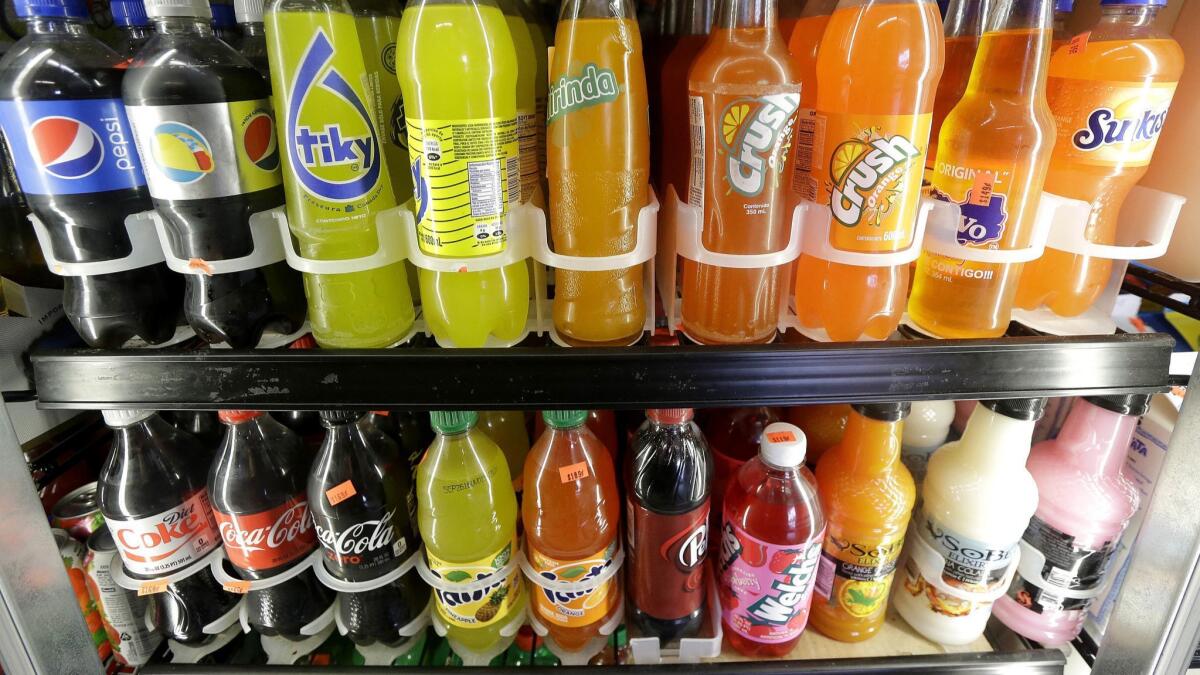Editorial: Is gulping soda as bad as smoking? California seems to think so

- Share via
In California, soda is the new tobacco — at least from a public policy point of view.
Adopting some of the same methods that have been employed to reduce smoking, California legislators have put together an ambitious package of bills aimed at curbing consumption of sodas, energy drinks and other beverages that have added sugar.
The proposals, which are sponsored by the California Medical Assn. and California Dental Assn., include levying a tax on sugar-sweetened beverages, mandating warning labels on their bottles and restricting how they are promoted and displayed in stores, as well as limiting the serving size of fountain drinks. The proceeds from the tax (the amount is yet to be determined) would fund programs to prevent obesity, diabetes and other health problems associated with the overconsumption of sugar.
One of the proposed measures that could show results is definitely worth exploring: taxes on drinks with added sugar.
It’s an intriguing approach that has already sparked a backlash from the soda industry and a public discussion about what role the government should play in grocery store purchases. Now the onus is on public health officials to make a clear and compelling case about the dangers — and to explain why sugary drinks deserve as harsh a regulatory response as cigarettes.
Getting people to cut back on sugary drinks is clearly a worthwhile endeavor. There’s no doubt Americans consume way too much added sugar in their diets, nearly triple the recommended daily limit, on average. Soda, fruity beverages and sports and energy drinks that offer little nutritional benefit and that studies show don’t leave you feeling full are certainly contributors to the nation’s obesity problem. And there’s no denying that the rates of obesity and Type 2 diabetes in both adults and children have reached alarming levels, accounting for an estimated $190 billion in healthcare costs.
But we’re not yet convinced that soda ought to be demonized to the same degree as tobacco, which is a uniquely toxic, highly addictive substance that can cause lasting harm and death even in small doses. Sugar and the caffeine found in some sodas and energy drinks can be habit-forming, but guzzling a soda here or there is unlikely to do health damage to an otherwise fit person who eats a healthy diet.
Additionally, some of the provisions in this package are of dubious merit. What’s the benefit of stamping a warning label on Coke or Pepsi bottles when they already carry enough nutritional information on the label to inform consumers about how much sugar and calories are inside? In any case, people already know that soda is not good for them. This is why schools have banned such beverages from their cafeterias and McDonald’s stopped including soda as a standard Happy Meal offering in 2013.
And capping the size of fountain sodas at 16 ounces (the equivalent of a small drink at McDonald’s), which one of the bills proposes, would have limited effect if restaurants allow free refills.
But one of the proposed measures that could show results is definitely worth exploring: taxes on drinks with added sugar. Last week, a three-year study of the tax on sugar-sweetened beverages imposed by Berkeley in 2014 — the first in the nation — found that people in low-income neighborhoods bought fewer sugary drinks after the tax was imposed, while consumption trends remained the same in neighboring cities that didn’t have such a tax. The study also found that the people who drank fewer sugary beverages consumed more water during the same period.
Enter the Fray: First takes on the news of the minute »
This finding mitigates the argument that such a regressive levy would hit low-income people the hardest. Poorer people, many of them black and Latino, would still suffer, economically and physically, if they continued to drink copious amounts of sugar-sweetened drinks. But black and Latino Californians have higher rates of obesity than other populations, so if the higher cost encouraged them to switch to healthier (and untaxed) water, it would be a double benefit to them.
The Berkeley results might have encouraged other cities to adopt their own soda taxes, but last year the Legislature and Gov. Jerry Brown agreed to prohibit local governments from doing so until 2031; in exchange, the beverage industry dropped a ballot measure that would have made it harder to raise any local taxes. That prohibition, however, does not extend to a statewide tax.
With so much of the food found at the grocery store packed with added sugars — even in “healthy” food such as yogurt, cereal and salad dressing — it makes sense to discourage consumption of the empty calories found in soda and other sugar-sweetened drinks. Effective and sensible strategies to do so are worth pursuing.
Follow the Opinion section on Twitter @latimesopinion and Facebook
More to Read
A cure for the common opinion
Get thought-provoking perspectives with our weekly newsletter.
You may occasionally receive promotional content from the Los Angeles Times.










